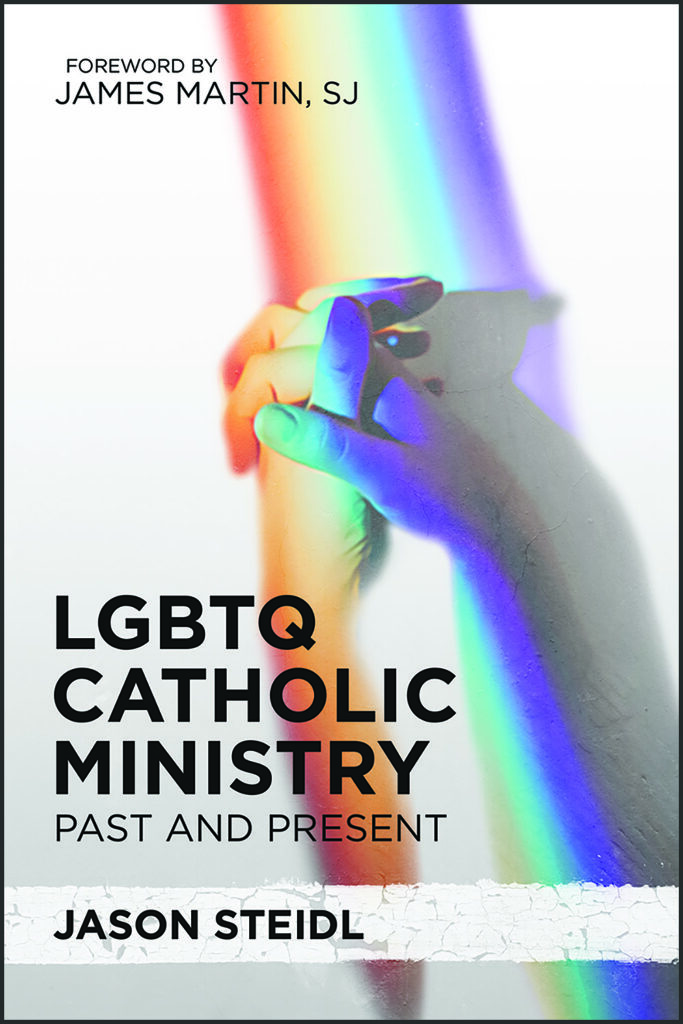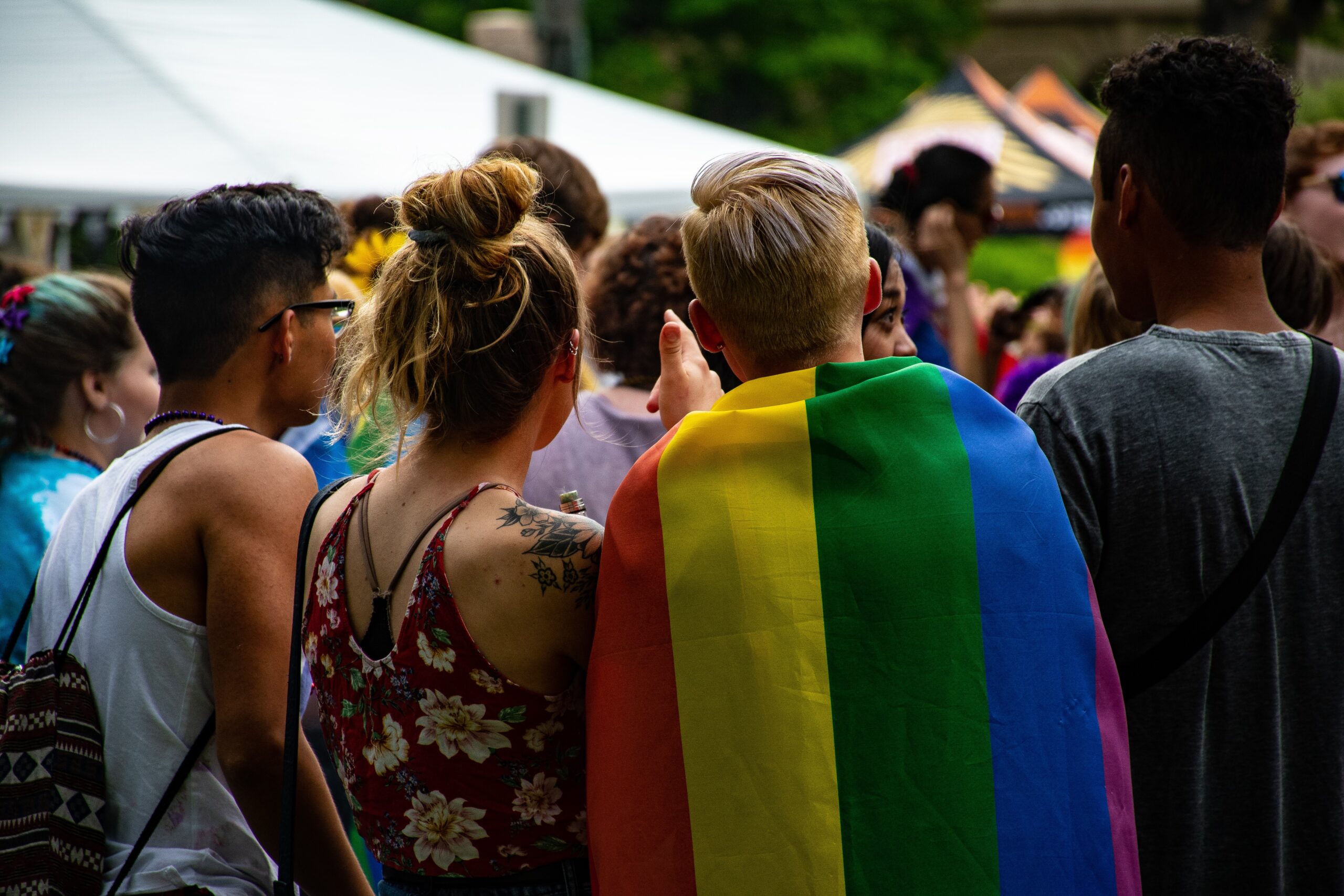The following is adapted from the introduction to LGBTQ Catholic Ministry: Past and Present, the new book written by Jason Steidl Jack and published by Paulist Press.
In 2018, the now retired Archbishop Charles Chaput of Philadelphia surprised many when he told the Synod on Youth, “There is no such thing as an LGBTQ Catholic.” Using the acronym in official church teaching, he suggested, would imply “that these are real, autonomous groups and the church simply doesn’t categorize people that way.”
His claim would be laughable were it not such a brazen attempt to erase LGBTQ Catholics. If there is no such thing as an LGBTQ Catholic, after all, their objections to homophobia and transphobia can go unanswered. If there is no such thing as an LGBTQ Catholic, there is no need to show them compassion.
The archbishop must know that church teaching does, in fact, categorize people by their sexuality. The Catechism of the Catholic Church labels same-sex desire as a “condition” and homosexual acts as “intrinsically disordered.” The Vatican bans men from seminary if they “practice homosexuality, present deep-seated homosexual tendencies or support the so-called ‘gay culture.’” Archbishop Chaput, along with other bishops, endorses Courage, a ministry for those who “experience same-sex attractions and those who love them.”
These are real categories with real consequences.
For many Catholic leaders, only certain groups categorized by their sexuality can be acknowledged: those who are ashamed of their “objective disorder” and struggle against their “homosexual inclinations.” The hierarchy’s anti-queer rhetoric adds to the church’s long history of institutional erasure, manipulation and spiritual abuse of LGBTQ people.
But this is not the only side of the story. For many decades, LGBTQ Catholics and allies have asserted their place within a religious institution that often denies their existence. They have done so by creating ministries of hospitality and affirmation that reflect their unique spiritualities and traditions. Due to social and ecclesial homophobia and transphobia, they also present unique pastoral needs.
For many decades, LGBTQ Catholics and allies have asserted their place within a religious institution that often denies their existence.
Today, the LGBTQ Catholic movement is gaining momentum. Grassroots attitudes are shifting and ministries are flourishing. The pope himself seems to be on board with many initiatives. It may be a time for cautious optimism, but we must also remember the painful past. LGBTQ apostolates are precarious and often face opposition from authorities at local, diocesan and universal levels of the church.
As long as Catholic leaders try to erase LGBTQ Catholics, it is all the more necessary to share their stories of perseverance.
Knowledge of our history is vital for both LGBTQ Catholics and allies. Most queer believers were raised in homes and parishes that taught us we were strange and did not belong. Homophobia and transphobia perpetuated our isolation and shame. There were few, if any, queer mentors, role models or saints. It took many of us years to integrate our faith and sexuality and find our place within the broader LGBTQ community.
Once we arrived, however, we discovered a people ennobled and emboldened by generations of struggle. We found ourselves surrounded and supported by a great “cloud of witnesses,” those saints— canonized or not—who lived with integrity and helped others to do the same. Queer believers belong to a proud movement that is making the church more Christlike. Our LGBTQ history affirms that we are not, and have never been, alone.

The church can also be terrifying for advocates of queer people. Many have greatly suffered for their solidarity with the queer community. The news is full of stories about LGBTQ and allied Catholics fired from their jobs in schools and parishes for coming across as too friendly to the movement. Is it worth it? When will change come?
Allies have been asking these questions for generations. Their efforts, nevertheless, matter a great deal. Allies help LGBTQ Catholics hold on to their faith. The burdens they take upon themselves make others’ burdens more bearable. Their solidarity and allyship are invaluable, and history is full of examples of perseverance that encourage them to press on.
For LGBTQ people, coming out is a prophetic act of resistance against erasure. Harvey Milk, one of the first openly gay politicians in the United States, told activists, “We will not win our rights by staying quietly in our closets … We are coming out! We are coming out to fight the lies, the myths, the distortions! We are coming out to tell the truth about gays!”
As a political, spiritual and relational tool, coming out functions in the church as well as it does in society. Queer Catholic honesty and vulnerability change hearts. In Catholic communities, telling the history of LGBTQ Catholics reveals that Archbishop Chaput and hierarchs like him are gravely mistaken. LGBTQ Catholics exist and have been a “real, autonomous” group for more than three-quarters of a century.
Queer believers belong to a proud movement that is making the church more Christlike. Our LGBTQ history affirms that we are not, and have never been, alone.
From a theological standpoint, LGBTQ Catholic stories are also sacred. They possess God-given power to challenge Christian homophobia and transphobia by revealing the innumerable ways that God moves outside of traditional family, relationship and even church structures. LGBTQ people belong to the Body of Christ, and they call the church to be more faithful to Christ’s mission of hospitality, compassion and accompaniment.
At the start of the gay liberation movement, a popular activist refrain proclaimed, “We are here. We are queer. Get used to it.” As LGBTQ Catholics and allies continue to struggle for recognition, affirmation and justice, their advocacy in the church echoes their forebears’ message: LGBTQ Catholic ministry is here. LGBTQ Catholic ministry is queer. And it’s time for the church to get used to it.




